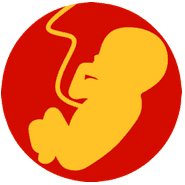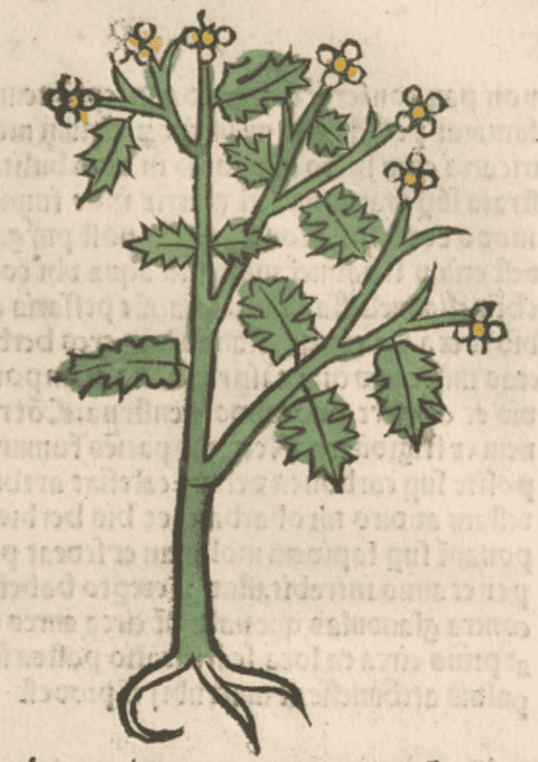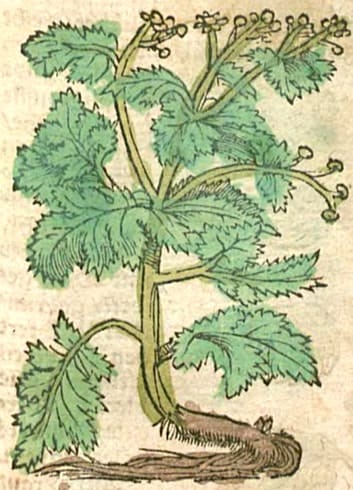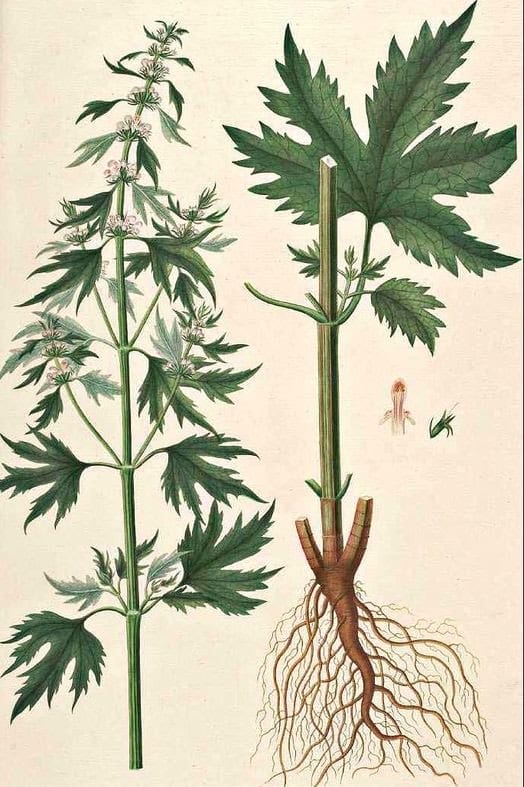Leonurus, Motherwort, Yi Mu Cao 益母草Also called Cardiaca, MatricariaYi Mu Cao (TCM) |

|

|

|

|
|
Herbarius latinus, Petri, 1485 |
Kurtzes Handtbuchlein, Ryff, 1599 |
 L. cardiaca
L. cardiacaOeder et al., Flora Danica, 1756 (1761-1883)
Botanical name:
Leonurus cardiaca (syn. L. crispus, L. campestris, L. glabra, L. discolor)
In TCM L. heterophyllus (syn. L. artermisia), L. sibiricus, L. macrathus and L. turkestanicus (in Xinjiang) are used.
Parts used:
Herb
Temperature & Taste:
Cool, dry (regarded as Warm in the West); Pungent, Bitter.
Classifications:
3D. CORDIALS & CARDIACS. 3G. EMMENAGOGUE
4c. CARDIAC. 4i. UTERINE
K. Move the Blood
Uses:
1. Moves the Blood, Resolves Stasis, Promotes Menstruation (TCM, West):
-chiefly for cold and windy diseases of the Womb
-irregular Menstruation, Menstrual cramping and pain, heavy menstruation with clotting
-PMS, irritability associated with Menstruation; Menopausal symptoms
-Infertility, especially associated with Blood stasis or Damp
-‘want of Venery’.
-traditionally used to promote easier Childbirth; difficult or prolonged Labor
-Retained Lochia, Postpartum abdominal Pain, Postpartum Bleeding
-fixed abdominal masses and tumors
-Traumatic pain, Bruising, Hematoma
2. Moves the Blood, Calms the Mind and Nerves, Benefits the Heart (West):
–‘infirmities of the Heart’. (Gerard)
-‘there is no better herb to take Melancholy vapours from the Heart … and makes a merry, cheerful Soul … of much use in trembling of the Heart’. (Culpeper)
–Oppression or Pain of the Chest, Palpitations, Rapid Heartbeat, Fainting, especially when related to Anxiety.
-Hypertension, Tachycardia
-Nervous Debility, Irritability in the elderly; Restlessness and Insomnia; Hyperthyroidism (especially with Palpitations)
-Migraine
3. Promotes Urine (TCM, West):
-Edema
-Nephritis, Hematuria, acute Renal Failure
-Gravel, Stones
4. Clears Heat, Stops Bleeding (TCM, West):
-Blood in the Urine, in the Stool, Uterine Bleeding, Postpartum Bleeding, Bloody Dysentery
5. Clears Phlegm, Relieves Wheezing (West):
-cold phlegm in the Lungs; Coughs and Asthma
6. Clears Heat, Resists Poison:
-Putrid Fevers (West)
-sores, abscesses, eczema, erysipelas, toxic swellings, itchy skin rashes (TCM, West)
7. Kills Worms (West)
8. Externally:
-externally for ‘suffocation of the Womb’, to promote Menstruation (as a Pessary)
-hardness of the Breasts (in a poultice)
-eases Gout pain
-relieves Fever
Dose:
Decoction: 6–15 grams
Powder: 1–3 grams
Comment:
1. The various species of Motherwort are used very similarly, especially in regards of its gynecological effects. The Chinese name Yi Mu Cao translates as ‘Benefit Mother herb’, a clear sign that its traditional use is akin to the western Motherwort.
2. The Chinese also use Motherwort seed (Chong Wei Zi); used similarly for irregular Menstruation, Dysmenorrhea, Amenorrhea, Postpartum abdominal pain; also for Liver heat with Headache, red and painful Eyes.
Substitutes
Mugwort has been used as a substitute.
Main Combinations:
Motherwort & Cyperus
Gynecology
1. Promote Menstruation, Amenorrhea:
i. Motherwort, Calamint, Balm
ii. Motherwort with Balm, Pennyroyal
iii. and clear Wind of the Womb, Motherwort with Pennyroyal, Mugwort, Balm, Vervain, Bay berry (as in Decoction for the Womb)
iv. Motherwort with Southernwood, Pennyroyal, Balm, Vervain
v. Motherwort, Rue, Camomile (Matricaria), Wintergreen (equal parts as a decoction) (Valuable Herbal Prescriptions, late ‘s)
vi. Motherwort with Valerian, Tansy, Mugwort, Wormwood, Mint, Marjoram, Pennyroyal, Ginger, Saffron (as in Hysteric Water of Poterius)
2. Dysmenorrhea:
i. obstructed by Cold, Motherwort with Cinnamon, Cumin
ii. obstructed by Blood stagnation, Motherwort with Myrrh, Zedoary
iii. obstructed by Blood stagnation, Motherwort with Dang Gui and Ligusticum Chuan Xiong (TCM)
iv. Motherwort with Restharrow, Madder, Horehound, Mugwort, Rosemary, Parsley seed, Saffron, Cinnamon (Formulaire de Montpellier, 1822)
3. Irregular or scanty Menstruation or Infertility from Blood stasis, combine Motherwort with Dang Gui and Salvia Dan Shen (TCM)
4. Hysteris, PMS: Motherwort, Mugwort, Juniper berry, Savin, Nigella, Amber, Aniseed, Lesser Cardamon (as in Hysterical Extract of Lazarus Riverius)
5. Coldness of the Womb, Motherwort (Yi Mu Cao), wine-fried Dang Gui, Mugwort (Ai Ye), Salvia Dan Shen, Ginger, Cinnamon (The Formulas of Dr. John H.F. Shen)
6. Ovarian pain and inflammation:
i. Motherwort with Cyperus rotundus, Wormwood, Calendula
ii. Motherwort with Horehound, Sunflower and Wormwood
7. Endometriosis:
i. Motherwort, Cyperus rotundus, Paeonia Mu Dan Pi, Safflower (Hong Hua)
ii. Motherwort, Dang Gui, Salvia Dan Shen, Dodder seed (Tu Si Zi), Paeonia Bai Shao, Corydalis Yan Hu Suo, Costus
8. To promote Fertility:
i. Motherwort, Balm, Mugwort, decoction orally or as a bath (Herbarius latinus, Petri, 1485)
ii. Motherwort, Balm, Ivory (Herbarius latinus, Petri, 1485)
Obstetrics:
9. Threatened Miscarriage:
i. Motherwort with Balm and Fennel seed (as in Decoction for Threatened Miscarriage)
ii. Chinese Mortherwort, Poria Fu Ling, Atractylodes Bai Zhu, Myrrh, Cyperus rotundus, Coriander seed, powder and form pills with Honey. These are called Preserve Pregnancy pills and were used for Threatened Miscarriage and to prepare for Labor. (Chinese Materia Medica, Stuauoft)
10. Postpartum:
i. abdominal pain, Motherwort (Yi Mu Cao) with Hawthorn (Shan Zha) (TCM)
ii. abdominal pain, Motherwort (Yi Mu Cao) with Safflower (Hong Hua) and Dang Gui
iii. Postpartum tonic, Motherwort, St. John’s wort, Nettle, Balm
iv. the whole plant of Chinese Motherowrt is dried and powdered, and formed into Honey pills. They are especially used for difficulties during Pregnancy and the Puerperal period. The were called Restore the Yin and Bring Back the Soul Pills. (Chinese Materia Medica, Stuauoft)
Heart, Circulatory:
11. To benefit the Heart:
i. Motherwort with Cinnamon, Saffron
ii. Motherwort with Hawthorn, Rosemary and Mistletoe
iii. Motherwort with Bugle, Lily of the Valley, Hawthorn berry
iv. Motherwort, Couch Grass, Mistletoe, Balm, Yarrow, Shepherd’s Purse, Rue, Yarrow, Dandelion, Fumitory (Treben)
v. Motherwort with Rose hip, Rosemary, Hawthorn, Calendula
12. Heart disorders with Anxiety or nervousness:
i. Motherwort with Balm, St. Johns wort
ii. Motherwort with Valerian, Balm
iii. Motherwort with Dang Gui and Salvia Dan Shen (TCM)
iv. Motherwort, Water Plantain leaf, Plantain, Southernwood, Valerian (The Medical Herbalist)
v. Valerian with Lavender, Motherwort, Caraway seed, Fennel seed (Meyer)
13. Hypotension, Motherwort with Rosemary, Balm and Hawthorn
14. Hypertension, Motherwort with Valerian, Mistletoe
Other:
15. Hyperthyroidism, Motherwort with Balm
16. Glandular swellings around the ears or groin, scarify, then apply powder of Motherwort and Mullein. (Herbarius latinus, Petri, 1485)
17. Paralysis, Motherwort with Asparagus root, Peony root, Betony, Cowslip, Four Cold Seeds, Calendula, Rosemary, Cinnamon, Raisins (as in Tincture for Paralysis)
18. Nephritis, Motherwort with Mugwort, Burdock, Valerian, Betony and Plantain (The Medical Herbalist)
19. Glomerulonephritis, Motherwort (Yi Mu Cao) with Astragalus (TCM)
Major Formulas
Decoction for Threatened Miscarriage (Gabelhover)
Decoction for the Womb (Schroder)
Tincture for Paralysis
Tian Ma Gou Teng Yin
Cautions:
1. Generally not used during pregnancy. Specialists in China have used the Chinese Motherwort in some ante-partum disorders associated with Blood stagnation, but it must be used cautiously. It has also been used for threatened Miscarriage in the West (see Decoction for Threatened Miscarriage, above). It is only suitable for cases with Heat and excess in which case it can be used for Bleeding during pregnancy, but dosage should be low-to-moderate. It has been used in the time leading up to Birth to prepare the Uterus.
2. Not used in marked Qi and Blood weakness or signs of Cold.
Drug Interactions:
1. May interact with anticoagulant medication.
Main Preparations used:
Distilled Water, Salt of the Ashes, Syrup, less commonly the Distilled Oil
1. Motherwort Extract (Chinese Pharmacopoeia):
‘Decoct 500 g of Herba Leonuri with water for 3 times, 2 hours, 1.5 hours and 1 hour respectively, filter, combine the filtrates, and concentrate to about 250 ml. Allow to cool, add the same volume of ethanol, stir well, stand for 24 hours. Filter, recover ethanol in vacuum (or just evaporate away, Adam) and concentrate to a thick extract. Dilute with water to 500 ml, refrigerate for 24 hours, filter, add an appropriate quantity of flavoring agents to the filtrate, adjust the total volume to 1000 ml with water, stir well, filter, pack and sterilize.’
Used for Menstrual disorders, lochiorrhea after childbirth due to stagnation of blood, continuous dripping of menstrual blood, postpartum subinvolution of the uterus. Dose: 10–20 mls 3 times daily.
